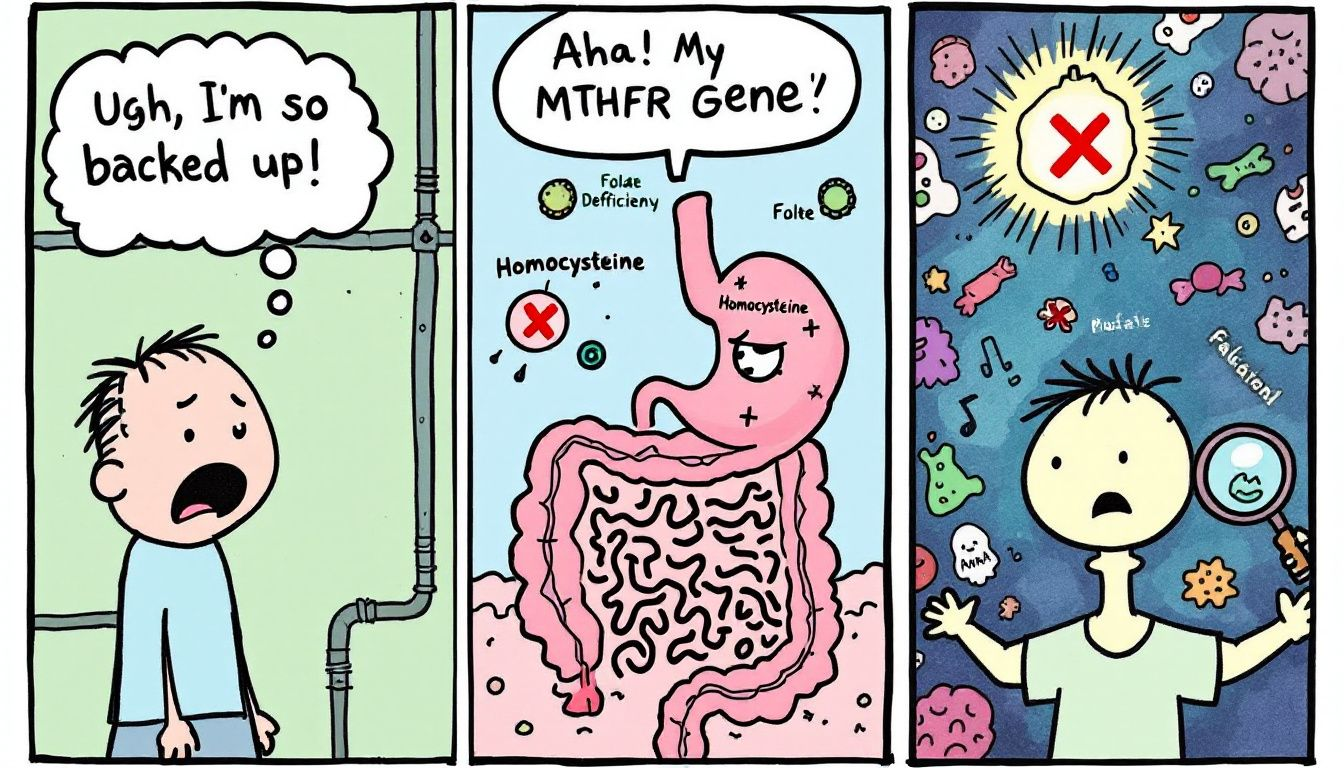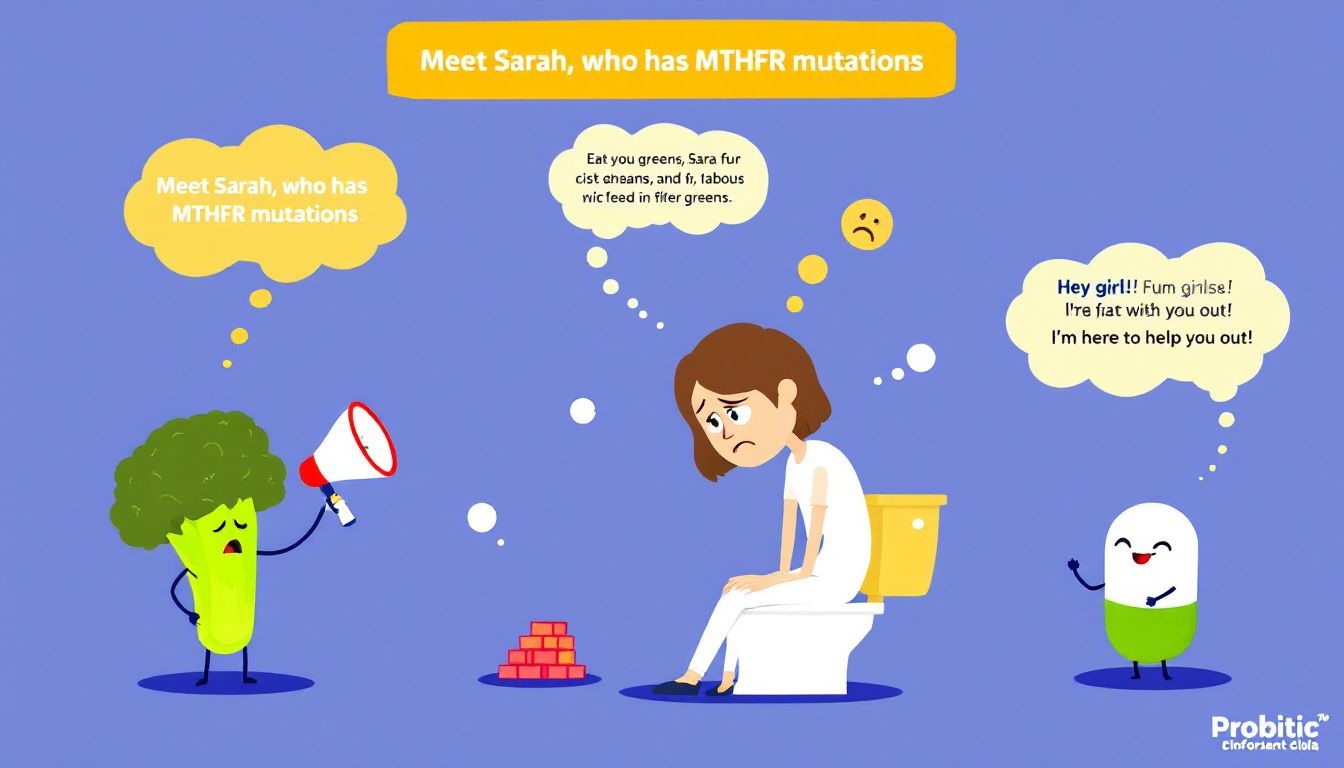Are you struggling with constipation and have an MTHFR gene mutation? Understanding how MTHFR mutations affect your digestive system can help you find effective solutions. In this article, we’ll explore the connection between MTHFR constipation, its symptoms, causes, and practical ways to manage it.
Key Takeaways
MTHFR mutations can disrupt methylation processes, leading to various digestive issues, including constipation.
Key symptoms of MTHFR-related constipation include bloating, abdominal discomfort, and chronic constipation, necessitating early recognition and medical consultation.
Effective management of constipation in individuals with MTHFR mutations involves dietary changes, supplementation with bioavailable folate, and lifestyle modifications to support gut health.
Understanding MTHFR and Constipation

The relationship between MTHFR mutations and gut health is intricate yet vital to comprehend. MTHFR, short for Methylenetetrahydrofolate Reductase, is a gene that plays a crucial role in various bodily functions, including detoxification, DNA synthesis, and energy production. When mutations occur in the MTHFR gene, these processes can be disrupted, leading to a cascade of health issues, including constipation.
Individuals with MTHFR gene mutations often experience a range of digestive symptoms that can significantly impact their quality of life. Recognizing the impact of these mutations on digestion helps in finding effective management strategies.
Exploring the MTHFR gene and its mutations provides insight into their role in digestive problems.
What is the MTHFR Gene?
The MTHFR gene, or Methylenetetrahydrofolate Reductase, is responsible for producing an enzyme that plays a pivotal role in the methylation cycle. This cycle is essential for numerous biological processes, including detoxification, DNA synthesis, and the creation of neurotransmitters. Proper functioning of the MTHFR gene ensures healthy methylation, which is crucial for maintaining overall health and efficient nutrient absorption.
However, MTHFR gene mutations can lead to significant health issues, including mthfr gene mutation. These mutations can result in methylation issues, such as elevated homocysteine levels, which are associated with various health complications, including cardiovascular diseases and fertility issues. Additionally, understanding mthfr genes is crucial for addressing these health concerns.
Additionally, weakened intestinal walls due to impaired methylation can lead to digestive problems like leaky gut syndrome. Understanding the role of the MTHFR gene and its variants is the first step toward managing the health issues they cause.
How MTHFR Mutations Affect Digestion
The methylation cycle supports several key bodily functions like DNA repair, detoxification, and neurotransmitter production. When MTHFR mutations disrupt this cycle, the consequences can be far-reaching, impacting both overall health and digestive health. Without proper methylation, individuals are at an increased risk of sickness and disease, which can manifest as various digestive symptoms.
Individuals with MTHFR gene variants are prone to several digestive conditions, such as leaky gut, irritable bowel syndrome (IBS), and inflammatory bowel disease (IBD). The disruption of the methylation cycle due to MTHFR mutations illustrates the interconnectedness of genetic factors and gut health. Understanding how these mutations affect digestion is key to finding suitable interventions and enhancing gut health.
Symptoms of Constipation Related to MTHFR Mutations

Constipation is a common issue among individuals with MTHFR mutations. These gene mutations can slow down intestinal transit times, leading to constipation and other digestive problems. Understanding the symptoms associated with MTHFR-related constipation can help individuals identify and address these issues more effectively.
Digestive symptoms linked to MTHFR mutations can vary widely, from mild discomfort to severe abdominal pain. Early recognition of these symptoms and seeking medical advice if they persist is important.
Examining common digestive symptoms and the challenges of chronic constipation in those with MTHFR mutations provides clarity.
Common Digestive Symptoms
MTHFR mutations are directly linked to several common digestive symptoms. Individuals with these mutations often experience bloating, abdominal discomfort, and excessive gas, which can significantly affect their quality of life. These symptoms can range from mild to severe, with some individuals experiencing conditions like irritable bowel syndrome (IBS) and inflammatory bowel diseases (IBD) such as Crohn’s disease and ulcerative colitis.
The presence of these digestive complaints can be disruptive, leading to chronic fatigue and other health issues. For those with MTHFR mutations, managing these symptoms is crucial for maintaining a good quality of life. Identifying and managing these symptoms early can prevent more serious health issues later.
Chronic Constipation and MTHFR
Chronic constipation can be particularly challenging for individuals with MTHFR gene variants. This condition can significantly disrupt daily life, causing ongoing discomfort and complicating daily activities. Consulting a doctor is recommended if constipation lasts more than a week without improvement.
Severe symptoms such as abdominal pain or rectal bleeding should prompt immediate consultation with a healthcare provider. Ignoring these symptoms could lead to complications, highlighting the importance of addressing chronic constipation proactively. Knowing how MTHFR mutations relate to chronic constipation aids in effective management of the condition.
Causes of Constipation in Individuals with MTHFR Mutations

Constipation in individuals with MTHFR mutations can be attributed to several factors. Reduced intestinal motility, disrupted folate metabolism, and compromised gut health are some primary causes. Recognizing these causes aids in finding effective management strategies.
This section explores how folate deficiency, diet and processed foods, and stress and toxins impact constipation in those with MTHFR mutations. Each of these factors plays a significant role in digestive health and can worsen constipation if not managed properly.
Impact of Folate Deficiency
Folate deficiency is a common issue for individuals with MTHFR mutations, leading to elevated homocysteine levels and reduced methylation efficiency. This deficiency can result in nerve and muscle function issues that contribute to constipation. Chronic constipation in those with MTHFR variants is linked to decreased intestinal motility due to elevated homocysteine levels.
Incorporating foods rich in natural folate, such as leafy greens and legumes, can support better digestion for those with MTHFR mutations. Improving gut health and alleviating constipation can be achieved by addressing folate deficiency through diet and supplements.
Role of Diet and Processed Foods
The diet plays a crucial role in digestive health, especially for individuals with MTHFR gene mutations. Consumption of highly processed foods can worsen digestive health due to their low nutritional value and high additives. Limiting processed foods and adding whole foods can enhance digestion for individuals with MTHFR mutations.
Dietary adjustments, such as increasing fiber intake and including fermented foods, can enhance gut flora and improve digestion. Such dietary adjustments can relieve constipation and bolster overall gut health.
Influence of Stress and Toxins
Chronic stress is another significant factor that can impair gut motility and exacerbate constipation in individuals with MTHFR mutations. Increased oxidative stress due to toxins can exacerbate inflammation and worsen gut health. Stress and exposure to environmental toxins can amplify gastrointestinal distress, making constipation more severe.
Activities like yoga and meditation can help manage stress and alleviate problems associated with MTHFR mutations. Reducing exposure to environmental toxins and chemicals aids in decreasing inflammation and improving gut health.
Solutions for Managing Constipation with MTHFR Mutations

Managing constipation related to MTHFR mutations requires a proactive approach and a combination of dietary, supplemental, and lifestyle changes. Elevated levels of homocysteine due to MTHFR mutations can reduce intestinal motility, leading to constipation. Effective management strategies can greatly enhance gut health and relieve constipation.
This section covers dietary adjustments, the role of supplements, and lifestyle changes to manage constipation in those with MTHFR mutations. Each of these solutions plays a vital role in promoting healthy digestion.
Dietary Adjustments
A diet rich in whole foods, including leafy greens and healthy fats, can improve digestion and alleviate constipation. Including fermented foods in the diet can enhance gut flora and improve digestion for those with MTHFR mutations. Processed foods may exacerbate digestive problems due to their low nutritional value and high additives.
Healthcare providers may recommend dietary modifications, increased fiber intake, or specific medications to alleviate constipation related to MTHFR mutations. Such dietary modifications are crucial for maintaining gut health and preventing constipation.
Importance of Supplements
Individuals with MTHFR mutations often struggle to convert folic acid into its active form, leading to folate deficiency, which can exacerbate digestive issues and constipation. Supplements like l-methylfolate, which is a bioavailable form of folate, are often recommended to aid those with MTHFR mutations in gut health and digestion.
Additionally, supplements such as magnesium and vitamin B6 can support digestive health and alleviate constipation. Supplements like these are vital for healthy methylation and overall gut health.
Lifestyle Changes
Incorporating a high-fiber diet can significantly aid in digestive health for those with MTHFR mutations. Managing stress through activities like yoga and meditation can alleviate issues related to MTHFR mutations and improve overall well-being.
These lifestyle changes, combined with dietary adjustments and supplements, can help manage constipation effectively and support long-term gut health. A holistic approach to health is essential for those with MTHFR mutations.
When to Consult a Healthcare Provider
Seeing a healthcare provider is vital for managing constipation linked to MTHFR mutations, especially when symptoms are severe or persistent. Severe symptoms that warrant immediate consultation include extreme abdominal pain, rectal bleeding, or significant changes in bowel habits.
Potential treatment options a healthcare provider might recommend include prescription medications, dietary adjustments, and possibly further diagnostic testing. It’s important to seek professional medical advice to ensure proper management and care.
Recognizing Severe Symptoms
Individuals with MTHFR gene mutations often experience severe digestive symptoms that can significantly affect their quality of life. Severe symptoms that require medical consultation include extreme abdominal pain, persistent constipation lasting longer than a few days, and signs of bowel obstruction.
Addressing these severe symptoms promptly is crucial, as they may indicate more serious underlying health issues. Seeking medical advice for severe symptoms ensures proper diagnosis and treatment.
Treatment Options
Individuals with the MTHFR gene variant should discuss the treatment course with their doctor before taking any medications. Healthcare consultation is key for managing constipation, particularly in those with MTHFR gene mutations.
Treatment options may include prescription medications, dietary changes, and further diagnostic testing to identify underlying issues. Personalized medical advice is essential for effective management and long-term health.
Summary
Understanding the connection between MTHFR gene mutations and digestive health can be a game-changer for those struggling with chronic constipation and other gut-related issues. By exploring the role of the MTHFR gene, recognizing symptoms, identifying causes, and implementing effective management strategies, individuals can take proactive steps towards improving their digestive health and overall well-being.
Remember, addressing MTHFR-related constipation involves a combination of dietary adjustments, appropriate supplements, lifestyle changes, and, when necessary, seeking medical advice. By adopting a holistic approach and being mindful of the specific needs of those with MTHFR mutations, it is possible to achieve better digestive health and a higher quality of life.
Frequently Asked Questions
What is the MTHFR gene and why is it important?** **?
The MTHFR gene is essential for proper methylation, impacting detoxification, DNA synthesis, and energy production. Its mutations can result in significant health problems, including digestive disorders.
How do MTHFR mutations affect digestion?** **?
MTHFR mutations significantly impact digestion by disrupting the methylation cycle, which impairs detoxification and nutrient absorption. This dysfunction can contribute to various digestive issues, including leaky gut and irritable bowel syndrome (IBS).
What are common digestive symptoms associated with MTHFR mutations?** **?
Common digestive symptoms associated with MTHFR mutations include bloating, abdominal discomfort, gas, and severe constipation, which can greatly affect one’s quality of life. It is important for individuals experiencing these symptoms to seek appropriate medical advice.
What dietary changes can help manage constipation related to MTHFR mutations?** **?
To manage constipation related to MTHFR mutations, it is beneficial to incorporate whole foods, leafy greens, healthy fats, and fermented foods while increasing fiber intake and reducing processed foods. These dietary changes can significantly enhance digestion and alleviate constipation.
When should I consult a healthcare provider for MTHFR-related constipation?** **?
You should consult a healthcare provider for MTHFR-related constipation if you experience severe symptoms like extreme abdominal pain, rectal bleeding, or if constipation persists for more than a week. Timely medical advice is crucial for effective treatment and diagnosis.

